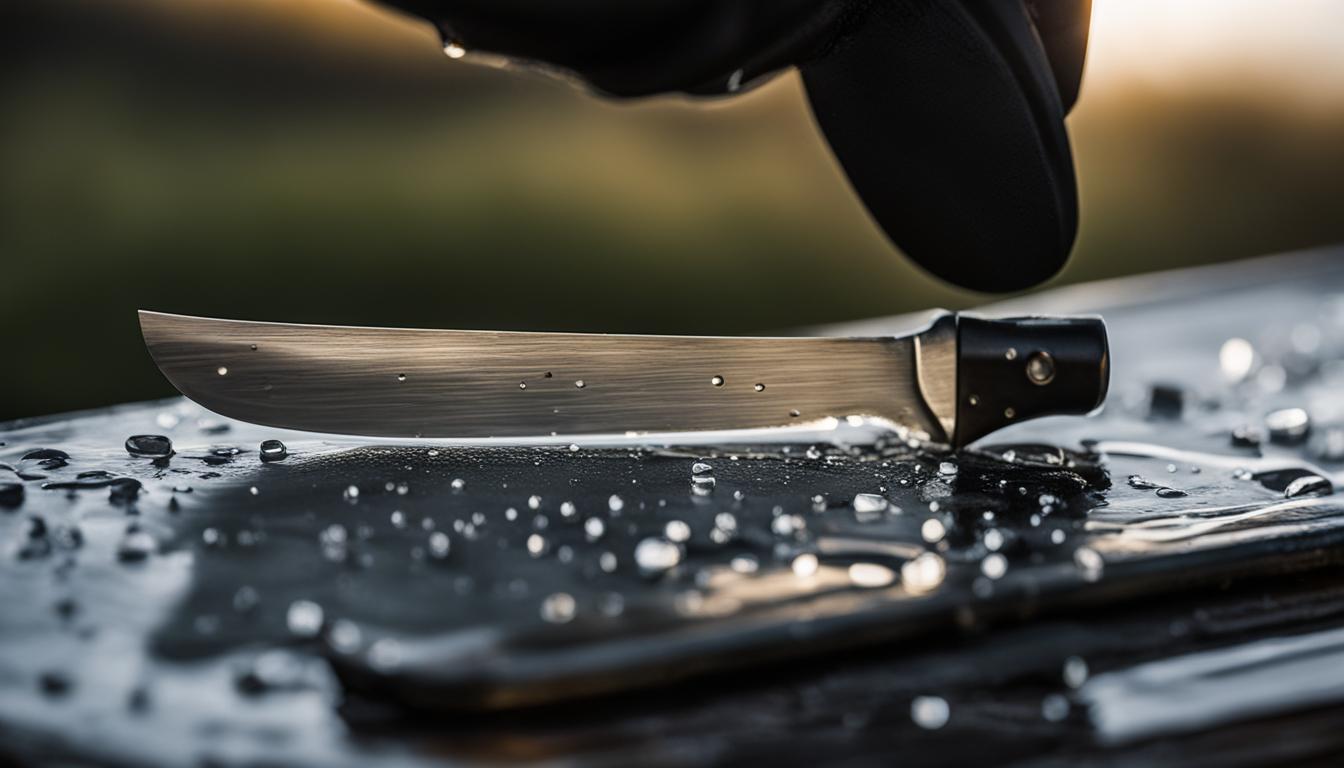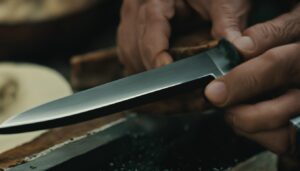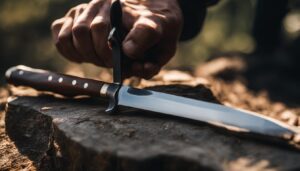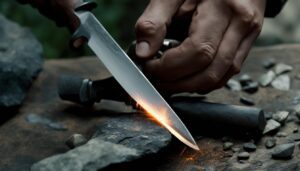Proper lubrication is essential for hunting knives to ensure they remain sharp, durable, and ready for use. Regular maintenance and lubrication can prevent dullness, rusting, and discoloration. Additionally, it helps to check for faults and damage, maintain the handle, and store the knife properly to prolong its lifespan. By following best practices and using the right lubricants, you can keep your hunting knife in peak condition for years to come.
Key Takeaways:
- Proper lubrication is crucial for maintaining the sharpness and durability of hunting knives.
- Regular maintenance and lubrication prevent dullness, rusting, and discoloration.
- Check for faults and damage regularly to ensure optimal knife performance.
- Maintain the handle and store the knife properly to prolong its lifespan.
- Using the right lubricants and following best practices will help keep your hunting knife in peak condition.
Importance of Proper Maintenance for Hunting Knife
Proper maintenance plays a crucial role in ensuring the longevity and performance of your hunting knife. By regularly maintaining and caring for your knife, you can ensure its sharpness, prevent rusting, and maintain its aesthetics. The importance of maintaining your hunting knife goes beyond just ensuring its functionality; it directly impacts your safety and the efficiency of your hunting experience.
Maintaining your hunting knife ensures that it stays sharp, maximizing its cutting power and reducing the risk of accidents during use. A sharp knife allows for precise and clean cuts, whether you’re skinning game or performing other outdoor tasks. Regular maintenance also involves checking for faults and damage, such as loose screws or chipped blades, which could affect the knife’s performance and compromise your safety.
Preventing rusting is another vital aspect of proper maintenance. Exposure to moisture and humidity can cause corrosion on the blade, compromising its integrity and reducing its lifespan. By thoroughly cleaning and drying your knife after each use and applying the appropriate lubrication, you can significantly reduce the risk of rust formation and ensure your hunting knife remains in optimal condition.
Lastly, maintaining the aesthetics of your hunting knife not only adds to its overall appeal but also contributes to its resale value. A well-maintained knife with a clean and polished appearance is more likely to retain its value over time. Proper maintenance involves regularly cleaning the handle, removing any dirt or debris, and using suitable cleaning methods to preserve the handle material’s integrity.
By understanding the importance of proper maintenance for your hunting knife and following best practices, such as regular cleaning, lubrication, and fault-checking, you can ensure its longevity, sharpness, and overall effectiveness. Taking the time to care for your hunting knife will not only enhance your hunting experience but also prolong the lifespan of your valuable tool.
Best Practices to Maintain a Hunting Knife
Properly maintaining a hunting knife is essential to ensure its longevity and optimal performance. By following these best practices, you can keep your knife in excellent condition for years to come.
Regularly Lubricate Your Hunting Knife
One of the most important maintenance tasks for a hunting knife is regular lubrication. Lubricating the moving parts of the knife, such as the pivot and locking mechanism, helps reduce friction and ensures smooth blade action. Use a high-quality knife lubricant or oil specifically designed for this purpose. Apply a small amount of lubricant to the pivot and other moving parts, then open and close the knife several times to distribute the lubricant evenly.
Proper Sharpening Techniques
Keeping your hunting knife sharp is crucial for its effectiveness. Proper sharpening techniques involve using sharpening stones or a sharpening system to maintain the desired edge. It’s important to follow the manufacturer’s recommendations and use the correct angle when sharpening your knife. Take your time and be patient during the sharpening process to ensure the best results. Remember to regularly check the blade’s sharpness and touch up the edge as needed.
Wash and Clean Your Knife After Use
After each use, it’s important to wash and clean your hunting knife thoroughly. Use mild soap and warm water to remove any dirt, debris, or residue from the blade and handle. Avoid using abrasive materials or harsh chemicals that could damage the knife’s finish. Pay special attention to the handle, as it can accumulate dirt and sweat over time. Dry the knife thoroughly before storing it to prevent moisture-related issues like rust.
Handle Repairs and Replacements
If you notice any faults or damage to your hunting knife, it’s essential to handle repairs promptly. While minor issues like loose screws or a worn-out handle can sometimes be fixed at home, more significant repairs should be left to professionals. Attempting complex repairs without proper knowledge or tools can further damage the knife or even cause injury. If necessary, contact the manufacturer or a reputable knife repair service to ensure your knife is restored to its optimal condition.
Proper Storage
When not in use, it’s crucial to store your hunting knife properly to protect it from the elements. A sheath or a protective container is recommended to prevent accidental damage and maintain blade sharpness. Ensure the knife is clean and dry before storing it to prevent rust or corrosion. Store the knife in a cool, dry place away from extreme temperatures and humidity. Regularly inspect the storage area to ensure there are no signs of moisture or pests that could damage the knife.
By following these best practices, you can ensure the proper maintenance of your hunting knife. Regular lubrication, proper sharpening techniques, thorough cleaning, and appropriate storage will help keep your knife in top condition, ready for your next hunting adventure.
Types of Lubricants for Hunting Knives
Proper lubrication is essential for maintaining the performance and longevity of your hunting knife. Choosing the right lubricant can ensure smooth blade action, reduce friction, and protect against rust and corrosion. When it comes to lubricating your hunting knife, there are several types of lubricants available:
1. Knife-Specific Lubricants
Knife-specific lubricants are specifically designed for moving parts in folding knives, making them an ideal choice for hunting knives with multiple joints and movable pivots. These lubricants are formulated to reduce friction and maintain smooth blade action, ensuring optimal performance in the field.
2. General-Purpose Lubricants
In addition to knife-specific lubricants, general-purpose lubricants such as mineral oil or gun oil can also be used for hunting knives. These lubricants are readily available and offer decent lubrication properties. However, they may not provide the same level of performance and corrosion resistance as knife-specific lubricants.
When choosing a lubricant for your hunting knife, consider factors such as ease of application, viscosity, and corrosion resistance. It’s important to select a lubricant that suits the specific needs of your knife and the conditions in which you’ll be using it.
| Lubricant Type | Pros | Cons |
|---|---|---|
| Knife-Specific Lubricants | – Designed for moving parts in folding knives – Reduce friction and maintain smooth blade action |
– May be more expensive than general-purpose lubricants – Limited availability in some areas |
| General-Purpose Lubricants | – Readily available – Decent lubrication properties |
– May not provide the same level of performance as knife-specific lubricants – May lack corrosion resistance |
Remember to apply the lubricant sparingly and evenly to the moving parts of your hunting knife. Too much lubrication can attract dirt and debris, compromising the knife’s performance. Regularly inspect and clean your knife to remove excess lubricant and maintain optimal functionality.
By choosing the right lubricant and properly maintaining your hunting knife, you can ensure its longevity and reliable performance for all your hunting adventures.
Conclusion
Proper lubrication is essential for maintaining hunting knives and ensuring their longevity. By regularly cleaning and oiling your knife, you can keep it sharp, prevent rusting, and extend its lifespan. Following best practices for knife maintenance, such as proper sharpening, cleaning, and correct usage, will contribute to keeping your hunting knife in peak condition.
When it comes to lubricating your knife, there are different types of lubricants to choose from. Knife-specific lubricants designed for moving parts in folding knives are ideal for hunting knives with multiple joints and movable pivots. General-purpose lubricants like mineral oil or gun oil can also be used. It’s important to choose a lubricant that suits your specific knife’s needs.
Remember to store your hunting knife properly, either in a sheath or a protective container, to protect it from the elements. By combining proper lubrication, maintenance, and storage, your hunting knife will remain a reliable and effective tool for many years of hunting and outdoor adventures.
FAQ
Why is proper lubrication important for hunting knives?
Proper lubrication is important for hunting knives to ensure they remain sharp, durable, and ready for use. It helps prevent dullness, rusting, and discoloration.
What are the benefits of regular maintenance for hunting knives?
Regular maintenance helps reduce the risk of accidents while skinning or butchering game, prevents rusting in humid or damp conditions, maintains the knife’s aesthetic appearance, and allows for the detection of faults and damage.
What are the best practices to maintain a hunting knife?
Best practices include regularly lubricating the knife’s moving parts, proper sharpening, washing and cleaning after each use, correct usage, handling repairs by professionals, taking care of the handle, and proper storage.
What types of lubricants can be used for hunting knives?
Knife-specific lubricants designed for moving parts in folding knives are ideal for hunting knives with multiple joints and movable pivots. General-purpose lubricants like mineral oil or gun oil can also be used. Consider factors such as ease of application, viscosity, and corrosion resistance when choosing a lubricant.
Why is proper lubrication crucial for maintaining hunting knives?
Proper lubrication helps ensure sharpness, prevents rusting and discoloration, and extends the lifespan of hunting knives. Following best practices for knife maintenance and choosing the right lubricant further contribute to their longevity.





